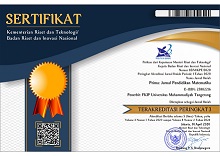ANALYSIS OF HIGH SCHOOL STUDENTS LOGICAL-MATHEMATICAL THINKING ABILITY BASED ON THE POLYA STAGE SOLVING IN TERMS OF MATHEMATICAL SELF-CONCEPT ABILITY
Abstract
This research is based on the importance of logical-mathematical thinking skills in solving logical-mathematical problems. The research purpose is to describe high school students' logical thinking abilities on geometric transformation material in terms of mathematical self-concepts. The research used a qualitative approach, with the research subject as many as six students of 12th grades science class from one of Bandung Regency high schools selected by sampling technique. Students' logical thinking ability is known from the test scores in solving compiled problems. The score refers to logical-mathematical thinking ability indicators, and the problem-solving technique refers to the Polya stages. Data analysis techniques used are data reduction, data presentation, descriptive statistical calculations, and conclusions/verification. The results showed that the overall students’ logical-mathematical thinking ability in the geometry transformation material is in the medium category. In the self-concept category, subjects with high self-concept can fulfil logical thinking questions based on Polya stages. As for subjects with moderate self-concept, the students can only fulfil several indicators of logical-mathematical thinking skills with problem-solving techniques. The result is still not perfect refer to the Polya stage. As for the subject with low self-concept, almost all Polya stages are not fulfiled. The students in the low self-concept category answered the questions incompletely. They had difficulty understanding the problem and planning a solution so that their answers did not match the questions.
Keywords
Full Text:
PDFReferences
Djaali. (2006). Psikologi Pendidikan. Bumi Aksara
Polya, G. (1973). How to Solve It. A New Aspect of Mathematical Method. New Jersey: Princenton University Press.
Puspitasari, I.W., Fauzan, G.A., & Bernard, M. (2019). Penerapan PBL dengan RME Berbantuan Software Geogebra untuk Meningkatkan Kemampuan Berpikir Logis Matematik Siswa. Jurnal On Education, 1(4), 679-687
Shavelson, R. J., & Bolus. (1982). Self-Concept: The Interplay of Theory and Methods. Journal of Educational Psychology, 74(1).
Sumarmo, U. (2006). Kemandirian Belajar: Apa, Mengapa Dan Bagaimana Dikembangkan pada Peserta Didik. Makalah disajikan pada Seminar Pendidikan Matematika di UNY tahun 2006 dan dilengkapi untuk bahan ajar Perkuliahan Isu Global dan Kajian Pendidikan Matematika di SPs UPI Februari 2011.
Sumarmo, Utari, dkk. 2012. Kemampuan dan Disposisi Berpikir Logis, Kritis dan Kreatif Matematik (Eksperimen Terhadap Siswa SMA Menggunakan Pembelajaran Berbasis Masalah dan Strategi Think Talk Write). Jurnal Pengajaran MIPA, Volume 17 (Nomor 1, April 2012). 17-33.
Syawahid, M. 2015. Kemampuan Berpikir Formal Mahasiswa. Beta Jurnal Pendidikan Matematika. Vol. 8 No.2 (Nov) 2015 Hal. 137-153; ISSN 2085- 5893. http://ejurnal.iainmataram.ac.id/index.php/beta
Thalhah, S. Z., Tohir, M., Nguyen, P. T., Shankar, K., & Rahim, R. (2019). Mathematical Issues in Data Science and Applications for Health care. International Journal of Recent Technology and Engineering, 8(2S11), 4153– 4156. https://doi.org/10.35940/ijrte.B1599.0982S1119
Tohir, M., Maswar, M., Atikurrahman, M., Saiful, S., & Pradita, D. A. R. (2020). Prospective Teachers’ Expectations of Students’ Mathematical Thinking Processes in Solving Problems. European Journal of Educational Research, 9(4), 1735– 1748. https://doi.org/10.12973/eu-jer.9.4.1735
Tohir, M., Susanto, Hobri, Suharto, & Dafik. (2018). Students’ Creative Thinking Skills in Solving Mathematics Olympiad Problems Based on Problem-Solving Polya and Krulik-Rudnick Model. Advanced Science Letters, 24(11), 8361–8364. https://doi.org/10.1166/asl.2018.12563
DOI: http://dx.doi.org/10.31000/prima.v6i1.5316
Article Metrics
Abstract - 2443 PDF - 1819Refbacks
Prima: Jurnal Pendidikan Matematika
Program Studi Pendidikan Matematika
Fakultas Keguruan dan Ilmu Pendidikan
Universitas Muhammadiyah Tangerang
Jl. Perintis Kemerdekaan I/33, Cikokol
Kota Tangerang, Indonesia
e-mail: primajpm@gmail.com
Prima: Jurnal Pendidikan Matematika (p-ISSN: 2579-9827 | e-ISSN: 2580-2216) is licensed under a Creative Commons Attribution 4.0 International License.







